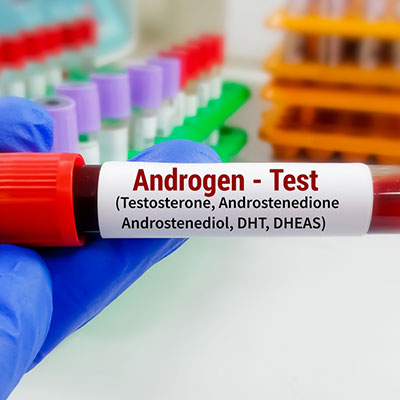Male hormone testing involves analyzing a blood sample to measure the levels of various hormones produced by the testes, adrenal glands, and pituitary gland. The primary hormone tested is testosterone, crucial for male development, muscle mass, bone density, and libido. Other hormones often included are luteinizing hormone (LH) and follicle-stimulating hormone (FSH), which regulate testosterone production, and sometimes prolactin and estradiol. These tests are typically performed to investigate symptoms like low sex drive, erectile dysfunction, fatigue, mood changes, or infertility. Results help diagnose conditions such as hypogonadism (low testosterone), pituitary disorders, or other hormonal imbalances, guiding appropriate treatment to restore hormonal health.
When is it recommended ?
Male hormone testing is typically performed when a man exhibits symptoms suggestive of hormonal imbalances, such as low libido, erectile dysfunction, fatigue, mood changes, or unexplained weight gain or loss. It's also common for doctors to order these tests as part of an infertility evaluation or when monitoring conditions like prostate cancer. The specific hormones tested usually include testosterone, luteinizing hormone (LH), and follicle-stimulating hormone (FSH), with other hormones like prolactin or estradiol sometimes included depending on the suspected issue. The timing of the test can be important, as testosterone levels are generally highest in the morning.

What is optimization?
Male hormone optimization is a process focused on balancing and improving hormone levels in men, primarily testosterone. As men age, testosterone levels naturally decline, which can lead to various symptoms like fatigue, decreased libido, muscle loss, and mood changes. Hormone optimization aims to restore these levels to a healthy range, often through lifestyle adjustments, nutritional support, or hormone replacement therapy (HRT). The goal is to alleviate these symptoms and improve overall well-being, energy levels, cognitive function, and physical performance. It's a personalized approach, often guided by medical professionals who assess individual hormone profiles and determine the most appropriate course of action.
Male hormone optimization, often involving testosterone replacement therapy (TRT), is primarily preferred in cases of clinically diagnosed hypogonadism, where the body doesn't produce enough testosterone. This can manifest with symptoms like fatigue, low libido, erectile dysfunction, decreased muscle mass, and mood changes. TRT is also considered for men with age-related testosterone decline who experience significant symptoms impacting their quality of life, provided underlying causes are ruled out. It's crucial that these treatments are administered and monitored by qualified healthcare professionals to ensure safety and effectiveness, as inappropriate use can have significant health risks.
